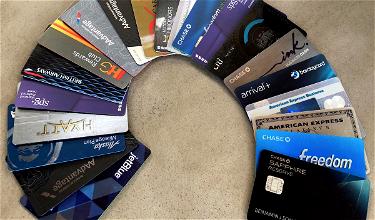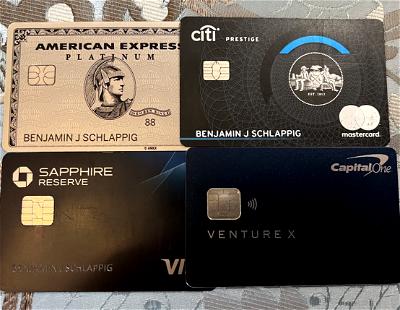Here at OMAAT our focus is typically on discussing how to maximize credit card rewards points, rather than discussing the potentially lucrative financing opportunities that some people take advantage of through credit cards.
It occurred to me that I’ve never before written about credit card 0% intro APR offers, so that’s exactly what I wanted to do in this post. I wanted to talk about the basics of how this works, what impact taking out a 0% APR offer has on your credit score, and also look at the best no annual fee cards for getting a great 0% intro APR offer.
In this post:
0% Intro APR Credit Card Offers Basics
Credit card issuers have several different ways to attract new customers. Many of us may consider whether a card has a limited-time welcome bonus, or what the rewards structure of a card is like.
But card issuers have other kinds of promotions as well — specifically, we sometimes see credit cards offer an introductory 0% purchase APR offer. This is typically only for new cardmembers for a limited time, so let’s talk about that for a bit.
Use Credit Card Financing Responsibly
I can’t stress this enough, because this can be really costly otherwise. Only use credit cards if you’re able to do so responsibly.
That means only use credit cards if their use doesn’t cause you to spend more than you’d otherwise spend (or spend uncontrollably), and only take advantage of a 0% intro APR offer if you’re sure you can pay back that amount before the 0% intro period ends, and/or if no better options are available to you.
That’s because typically financing rates after the 0% intro period can be quite high, and you don’t want to be stuck paying a fortune in interest.
That being said, for some people strategically using a 0% intro APR offer can make a lot of sense.
When Should You Consider A 0% Intro APR Offer?
Think of a 0% intro APR offer as being an interest-free loan for some period of time. This could be really useful if:
- You’re making an unusually big purchase (such as for a home renovation, a medical procedure, or purchasing equipment for your business) but want to spread out your payments over time, rather than paying it all at once
- If you’re just a little behind on payments after the holidays, and need a few months breathing room to pay off your balances
- If you’d otherwise be financing purchases at much higher rates
- There’s a short term opportunity for you to earn more interest with your money (I’m not talking about gambling or investing in risky stocks, but rather you can earn interest with some checking accounts, etc.)
If you do take advantage of a 0% intro APR offer, make sure you have a plan for how you’re going to pay it off. In other words, don’t wait until the final month to pay it off, only to have something else come up last minute.
I recommend making more than the minimum payments each month to pay down your balance, and possibly keeping the money in reserves so you could pay it off at any point
How Does Credit Card Financing Work?
It’s pretty straightforward. When you apply for a card with a 0% intro APR offer, just make the purchases you want to make (up to the credit limit, of course), and then you’ll have the option to finance those over time.
If there’s a minimum payment due then of course make sure you pay that. Also make sure you mark your calendar for exactly when the 0% intro period ends, and leave yourself plenty of time.
Does A 0% Intro APR Offer Impact Your Credit Score?
Taking advantage of a 0% intro APR offer (or any credit card financing, for that matter) can indirectly impact your credit score.
Your credit score is made up of the following factors:
- 35% of your score is made up of your payment history
- 30% of your score is your credit utilization
- 15% of your score is your credit history
- 10% of your score is made up of the types of credit you use
- 10% of your score is your request for new credit
The only real implication this could have on your credit score is that it could impact your credit utilization, which makes up 30% of your score.
Credit utilization refers to the amount of your available credit that you’re using, and whatever you’re financing would count towards that limit.
In other words, let’s say you have a credit card with a $10,000 credit line and you take out a 0% intro APR offer for $5,000. You’d be utilizing 50% of your credit, and that would potentially be bad for your score.
So how can you minimize the impact of this?
- The more credit cards you have, the more total available credit you’ll have, and the less of an impact it will have on your credit utilization (since credit utilization is based on your total available credit across all your cards)
- Ideally don’t utilize more than 30% of your credit line on any particular card, to minimize any negative impact on your credit score (though in a crunch you can go over — the impact won’t necessarily be massive, and your score should recover pretty quickly once you pay it off)
- Minimize the utilization on your other credit cards at the same time to mitigate the impact of this; you can do this by paying off your balances before the statement even closes, because your utilization is measured based on your balance on your statement closing date
The Best Credit Cards With 0% Intro APR Offers For June 2025
With that out of the way, what are some of the best no annual fee credit cards with 0% intro APR offers at the moment? Here are some of my top picks, based on a few factors, including:
- How long the 0% intro APR offer is valid for (the cards on this list range from nine to 15 months)
- What kind of welcome bonuses the cards offer (after all, you might as well pick up some rewards for opening a card)
- How generous the cards are in terms of perks and rewards offered on spending
I’ve tried to include cards from as many issuers as possible, in case you have a preference either due to your banking relationship, odds of approval, or whatever else.
The Best 0% Intro APR Personal Cards
Below are my favorite 0% intro APR personal cards, including cards issued by Chase, and Citi. All of these cards offer 0% intro APR for 15 months.
1. Chase Freedom Unlimited®
- Annual fee: $0
- 0% Intro APR period: 15 months (after that 18.99% - 28.49%)
- Welcome bonus: Intro Offer: Earn a $200 Bonus after you spend $500 on purchases in your first 3 months from account opening
Why I recommend this card: This is a well-rounded card with a good bonus, and it allows you to combine rewards with other Chase cards to earn valuable Ultimate Rewards points. Learn more about the Chase Freedom Unlimited here.
2. Chase Freedom Flex℠
- Annual fee: $0
- 0% Intro APR period: 15 months (after that )
- Welcome bonus: Earn a $200 Bonus after you spend $500 on purchases in your first 3 months from account opening.
Why I recommend this card: This card offers 5% cash back in rotating quarterly categories, 5% cash back on travel purchased through Chase Travel℠, 3% cash back on dining, takeout, and eligible delivery services, 3% cash back on drugstores, and 1% back on other purchases. If you spend a lot in those bonus categories, this can be a great card. Rewards can also be converted into Chase Ultimate Rewards points. Learn more about the Chase Freedom Flex here.
3. Citi Rewards+® Card
- Annual fee: $0
- 0% Intro APR on purchases from date of account opening. After that, the variable APR will be 18.74% - 28.74%, based on your creditworthiness. 0% Intro APR on balance transfers for 15 months from date of first transfer. After that, the variable APR will be 18.74% - 28.74%, based on your creditworthiness. There is an intro balance transfer fee of 3% of each transfer (minimum $5) completed within the first 4 months of account opening. After that, your fee will be 5% of each transfer (minimum $5).
- Welcome bonus: 20,000 points after spending $1,500 within three months of account opening.
Why I recommend this card: The card has a good rewards structure, as it offers 2x ThankYou points at supermarkets and gas stations (on the first $6,000 spent per calendar year and then 1x), 1x points on all other purchases, and with each purchase your points are rounded up to the nearest 10 ThankYou points. Learn more about the Citi Rewards+ here.
The Best 0% Intro APR Business Cards
Below are my favorite 0% intro APR business cards, including cards issued by American Express, and Chase. These cards offer 0% intro APR for anywhere from nine to 12 months.
1. Ink Business Unlimited® Credit Card
- Annual fee: $0
- 0% Intro APR period: 12 months (after that 17.49% - 23.49%)
- Welcome bonus: Earn $750 bonus cash back after you spend $6,000 on purchases in the first 3 months from account opening.
Why I recommend this card: This is a well-rounded card with a massive bonus, and it offers 1.5% cash back on all purchases (and in conjunction with select other cards, those rewards can be converted into Ultimate Rewards points). Learn more about the Ink Unlimited here.
2. Ink Business Cash® Credit Card
- Annual fee: $0
- 0% Intro APR period: 12 months (after that 17.49% - 25.49%)
- Welcome bonus: Earn $350 when you spend $3,000 on purchases in the first three months and an additional $400 when you spend $6,000 on purchases in the first six months after account opening.
Why I recommend this card: The card offers 5% cash back in select categories, which can help your business be hugely rewarded for purchases. In conjunction with select other cards, rewards can be converted into Ultimate Rewards points. Learn more about the Ink Cash here.
3. The Blue Business® Plus Credit Card from American Express
- Annual fee: $0 (Rates & Fees)
- 0% Intro APR period for purchases: 12 months from the date of account opening (Rates & Fees) (after that 17.49% - 27.49%)
Why I recommend this card: This is my single favorite no annual fee business credit card. It offers 2x Amex Membership Rewards points on the first $50,000 spent every calendar year; I value those points at 1.7 cents each, so to me that’s like a 3.4% return on spending. Learn more about the Blue Business Plus here.
4. The American Express Blue Business Cash™ Card
- Annual fee: $0 (Rates & Fees)
- 0% Intro APR period for purchases: 12 months from the date of account opening (Rates & Fees) (after that 17.49% - 27.49%)
Why I recommend this card: The card offers 2% cash back on all eligible purchases on up to $50,000 per calendar year, then 1%, making this one of the most rewarding no annual fee cash back business cards out there for everyday spending. Learn more about the Blue Business Cash here.
Bottom Line
Credit card 0% intro APR offers aren’t for everyone. I’ll take it a step further. I think these should be avoided unless you have a specific use for the 0% intro APR, and a plan to pay it off within the promotional period.
So if you are someone who is considering this, hopefully, one of the above dozen excellent no annual fee cards works for you, in offering anywhere from nine to 15 months of 0% APR.
Have you taken advantage of a 0% intro APR offer? What card did you use, and did you pay the amount back before higher interest rates kicked in?
The following links will direct you to the rates and fees for mentioned American Express Cards. These include: The Blue Business® Plus Credit Card from American Express (Rates & Fees), and The American Express Blue Business Cash™ Card (Rates & Fees).





Any business cards have 0% balance transfer fee?
Big advantage for this retiree: since the money to pay off the card comes from an IRA, spreading payments across two tax years keeps us in a lower tax bracket each year. This would be just as true for someone who will be drawing from an investment account to pay a large bill.
Big caveat: never use a balance transfer card for spending till the balance transfer is paid off. If you do, your minimum-ish...
Big advantage for this retiree: since the money to pay off the card comes from an IRA, spreading payments across two tax years keeps us in a lower tax bracket each year. This would be just as true for someone who will be drawing from an investment account to pay a large bill.
Big caveat: never use a balance transfer card for spending till the balance transfer is paid off. If you do, your minimum-ish payment goes to pay down the 0% piece, while your purchases accrue high interest. Put NOTHING ELSE on a balance transfer card till the balance transfer is paid off.
Sincerely, please be cautious about writing posts with a financial slant. Quite a few facts and caveats missing, ie. balance transfer fees, difference between promo interest vs deferred interest promos, etc.
Also, BIG miss: balance transfers don't generally count as eligible spending/purchases towards any sign up bonus.
Love your site. Any reason you're the only one writing these days?
The Amex every day card has a great offer right now. $0 balance transfer fee, no interest on transfers and new purchases for 15 months, AND a 10,000 point bonus if you spend $1,000 in the first 3 months. This is far more compelling than some that you listed that hit you with a 3-5% balance transfer fee.
"Use Credit Card Financing Responsibly"
I find this to be an oxymoron. Buying something you can't afford is not responsible.
"only use credit cards if their use doesn’t cause you to spend more than you’d otherwise spend"
How can you even say this? This flies directly in the face of recommending 0% financing on credit cards, because if you didn't have the 0% card to finance on, you wouldn't be spending that...
"Use Credit Card Financing Responsibly"
I find this to be an oxymoron. Buying something you can't afford is not responsible.
"only use credit cards if their use doesn’t cause you to spend more than you’d otherwise spend"
How can you even say this? This flies directly in the face of recommending 0% financing on credit cards, because if you didn't have the 0% card to finance on, you wouldn't be spending that money.
"It occurred to me that I’ve never before written about credit card 0% intro APR offers"
Yeah, because you are a points and miles enthusiast, not a "finance stuff" enthusiast. I hope it stays that way, because this article sounds like it's coming from the banking industry, not the travel industry.
@Ben
the credit score change all depends on many factors. It's going to hurt the score but it depends on your overall credit line availability and utilization ratio. Say you have $200k total credit line available and you have no other significant balance, maxing out on 1 card for $10K balance isn't going to make any much difference.
As Joseph mentioned above, I recently took advantage of a BofA card that has intro 0%...
@Ben
the credit score change all depends on many factors. It's going to hurt the score but it depends on your overall credit line availability and utilization ratio. Say you have $200k total credit line available and you have no other significant balance, maxing out on 1 card for $10K balance isn't going to make any much difference.
As Joseph mentioned above, I recently took advantage of a BofA card that has intro 0% balance transfer fee and transferred about $45000 worth of dept there. I have sizable credit card debt that I've been floating on number of credit cards with 0% APR but have been paying between 1-3% fee as I find that cheaper than getting a home equity loan (no I am not in a financial trouble as I could easily pay this off but I decided to invest in stock instead and did pretty well over the years)
$45000 balance transfer at 3% would have been $1350 in fee so I essentially got one of the most lucrative signing bonus on a card that didn't have any signing bonus and without any spending!
One thing you didn't include is that, afaik, all those cards are 0% APR but do have balance transfer fees. Bank of America has a card that is 0% intro APR plus 0% intro balance transfer fee.
I'll emphasize what you said about knowing the dates. I once did this, got a little confused and ended up having to pay interest at the end. It turns out the end date of the intro APR is included in the statement.
The BBP has a 15K sign up bonus if you use a referral link.
Curious if anyone has an anecdotal account of what happened to their credit score after racking up a big balance on one of these 0% PERSONAL cards?